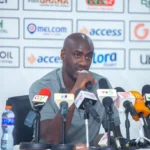President Cyril Ramaphosa cast his ballot alongside his wife Dr. Tshepo Motsepe on Wednesday morning in South Africa’s pivotal national elections that pose the biggest challenge yet to his African National Congress party’s 30-year grip on power.
Ramaphosa joined the thousands forming long lines at voting stations across the country before polls opened at 7 a.m. local time, exercising his democratic rights at Hitekani Primary School in the iconic Soweto township, the heart of the nation’s anti-apartheid struggle.
It was a symbolic start to what could be a watershed day for the ANC’s historic liberation movement, which Ramaphosa has led since 2017. Opinion polls suggest the party faces an unprecedented struggle to extend its dominance, with the real possibility it could be forced into a coalition government for the first time.
As he cast his vote, Ramaphosa said the election represented an opportunity to renew the ANC’s mandate from the people. But he struck a realistic tone about the stiff opposition the party faces after years of economic stagnation and scandals over government corruption.
The 70-year-old president has campaigned vigorously on his reformist credentials, highlighting efforts to tackle graft and revive economic growth. But South Africa’s economy shrank over 6% during his first term, with crippling power blackouts undercutting business confidence.
Opposition parties like the centrist Democratic Alliance and Economic Freedom Fighters have hammered the ANC’s record. While no single party is expected to unseat the ANC outright, a poor showing could force it into a coalition with smaller factions to stay in power.
Over 27 million registered voters are eligible to directly elect a new 400-seat National Assembly, which will then choose the president to lead for the next five years. Long lines of determined South Africans queued up to cast their ballots across the nation’s 23,000 polling stations.
The Electoral Commission urged patience, cautioning official results won’t be finalized until the weekend due to the expected high turnout across South Africa’s nine provinces. But a smooth transfer of power, regardless of the outcome, will be scrutinized as proving the maturity of the nation’s democracy.
As he awaited his turn at the classroom-turned-polling station in Soweto, where two of his presidential predecessors also voted, 66-year-old Ramaphosa supporter Jabu Fakude said he hoped for ANC’s renewal under the president’s leadership.
For the ANC’s loyal base, the election could serve as a referendum not just on Ramaphosa’s first term in office, but the party’s ability to remain the preeminent force of liberation and transformation in post-apartheid South Africa.









